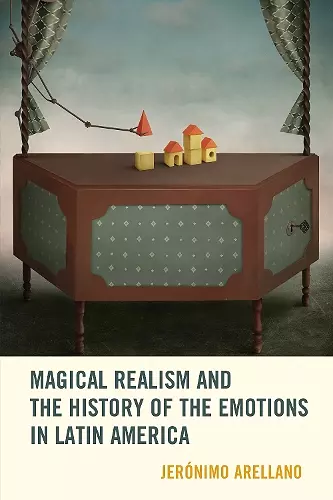Magical Realism and the History of the Emotions in Latin America
Format:Hardback
Publisher:Associated University Presses
Published:21st May '15
Currently unavailable, and unfortunately no date known when it will be back

Iconoclastic in spirit, Magical Realism and the History of the Emotions in LatinAmerica is the first study of affect and emotion in magical realist literature. Against the grain of a vast body of scholarship, it argues that magical realism is neither exotic commodity nor postcolonial resistance, but an art form fueled by a search for spaces of wonder in a disenchanted world. Linking the rise and fall of magical realism and kindred narrative forms to the shifting value of wonder as an emotional experience, this thought-provoking study proposes a radical new approach to canonical novels such as One Hundred Years of Solitude. Received as “one of the most convincing manifestations of the ‘turn to affect’ in contemporary Latin American critical thought,” Magical Realism and the History of the Emotions draws on affect theory, the history of emotions, and new materialism to reframe key questions in Latin American literature and culture.
“This is an excellent scholarly contribution that does not limit itself to regional contexts and instead traces transcultural and transnational connections in the study and reevaluation of the Latin American chronicle and magical realist narratives. . . . Essential.” —Choice, April 2016 * Choice Reviews *
"This study sheds a novel light on an already extensively researched topic. The argument is daring, subtle and remains engaging throughout the book." —Forum for Modern Language Studies, 2016 * Forum For Modern Language Studies *
“Una de las más convincentes demostraciones de la productividad del llamdo 'giro afectivo' en el pensamiento crítico latinoamericano contemporáneo. Un acercamiento pionero a la maravilla en el marco de la cuestión del afecto y las emociones en la historia de América Latina.” —Revista de crítica literaria latinoamericana, 2015 * Revista de crítica literaria latinoamericana *
"Magical Realism and the History of the Emotions in Latin America makes a valuable contribution to a crowded area of research by approaching magical realism through affect studies, the history of the emotions, and new materialist studies. Impeccably researched in all areas of expertise, [it] is a sophisticated study that models the kinds of innovative readings that new emotions-based and object-oriented theories may facilitate in Latin American literary and cultural studies." —Modern Language Quarterly, December 2016 * Modern Language Quarterly *
"Arellano's brilliant study recasts the genealogy of the marvelous ordinary in Latin American literature. It provides a fresh, new look at a seemingly overanalyzed literary mode, Magical Realism, by contextualizing it with contemporary theories of affect, the cultural history of wonder, the sociality of emotions, as well as the changing structures of feeling and material practices. This book reveals a new history of wonder from the margins of the colonial/modern world-system, by revisiting the historical relationship—in both temporal and spatial terms—among magical realist narratives' expression of wonder and those of the early modern Wunderkammer (cabinet of wonder) and the chronicles of the New World." —Ignacio López-Calvo, University of California, Merced -- Ignacio López-Calvo, University of California, Merced
"Jerónimo Arellano's refreshing study is a subtle, thoughtful, and stimulating reassessment of Latin American literary history. Using notions of both affectivity and emotion, Arellano sheds new light on the wonder discourse of the 'New World' and comprehensively punctures and problematizes the common assumption that modern Magical Realist writing is essentially rooted in traditional versions of such a discourse." —Philip Swanson, Hughes Professor of Spanish, University of Sheffield, UK -- Philip Swanson, Hughes Professor of Spanish, University of Sheffield
"A very well researched study...contributing to the current critical re-examination and re-assessment of magical realism” —Bulletin of Latin American Research, 2018 * Bulletin of Latin American Research *
"An erudite, thought-provoking, and intellectually-probing volume. . . . It is a contribution to Latin American studies meant to last.” —Revista de Estudios Hispánicos, March 2018 * Revista de Estudios Hispánicos *
“La alta calidad teo´rica y la profundidad de las reflexiones, adema´s de la acertada combinacio´n de la historia de las emociones con los estudios de los afectos, hacen de este libro una aportacio´n significante para los estudios culturales y una aplicacio´n inteligente del estudio de los sentimientos a un a´mbito interdisciplinario.” —Iberoamericana, 2018 * Iberoamericana *
“Arellano’s discussion on the history of the marvelous ordinary and the ordinary marvel in Latin American history and literature adds to the discussion about magical realism, its origins and its impact on the Americas. The innovative interdisciplinary approach . . . offers a significant contribution to the studies of affectivity in Latin American and cultural studies.” —The Latin Americanist, 2016 * The Latin Americanist *
“How do we experience wonder? Have people always felt wonder in the same way? How has the way we write about wonder changed over time? These questions lie at the heart of Jerónimo Arellano’s Magical Realism and the History of the Emotions in Latin America, which examines expressions of wonder in Spanish colonial writings and in Latin American magical realism. . . . Arellano rejuvenates the field by interpreting canonical texts through the critical lens of affect studies.” —Transmodernity, Fall 2016 * TRANSMODERNITY: Journal of Peripheral Cultural Production of the Luso-Hispanic World *
"Magical Realism and the History of the Emotions in Latin America successfully directs the insights of the affective turn in the humanities towards magical realism and Latin America. This changes the game as far as our thinking about magical realism is concerned." —Chris Warnes, editor of Magical Realism and Literature * Magical Realism and Literature *
ISBN: 9781611486698
Dimensions: 236mm x 157mm x 24mm
Weight: 503g
244 pages